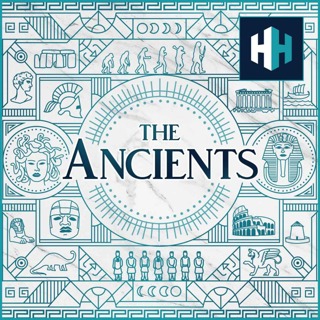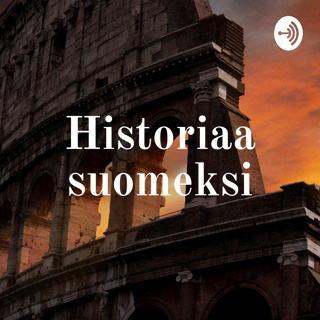
Pompeii and the Eruption of Mount Vesuvius
Pompeii is back in the news. An extraordinary new, touching discovery, found during the Great Pompeii Project of Professor Massimo Osanna and his team. Roughly 700 metres northwest of Pompeii, in the remains of a suburban Roman villa, archaeologists have unearthed the incredibly-preserved remains of two men, victims of the infamous eruption of Mount Vesuvius that occurred almost 2,000 years ago in 79 AD.So what do we know about the eruption? What do we know about this terrible event that has left Pompeii with this astonishing legacy? Daisy Dunn came back on the show for this special, emergency podcast to talk through what we know about the eruption and those who witnessed it.Daisy is the author of In The Shadow of Vesuvius: A Tale of Two Plinys. She has also appeared on the Ancients podcast earlier this year, talking about Rome’s most erotic poet Catullus. Hosted on Acast. See acast.com/privacy for more information.
26 Marras 202051min

Linothorax: Kevlar of the Ancients
The House of the Faun in Pompeii is known for being one of the largest and most impressive private residences in the ancient city. Among its many works of art is a depiction of Alexander the Great in battle. In previous episodes we have discussed Alexander’s rule and empire, but this time, let’s focus on his armour, as shown in this mosaic on the floor of the House of Faun, the only contemporary portrayal of linothorax on a known figure. For, instead of wearing bronze or iron armour as one might expect, Alexander is going into battle wearing a breastplate of linen. Gregory Aldrete has spent 12 years studying the composition and effectiveness of this ancient armour used by many nations around the Mediterranean. To do so, he recreated the armour from scratch, using authentic materials. In this episode Gregory, Professor Emeritus from The University of Wisconsin, Green Bay, speaks with Tristan about how this armour protected one of the most powerful conquering armies of all history, despite being made of a soft fabric. Hosted on Acast. See acast.com/privacy for more information.
22 Marras 202048min

Volcanic Vineyards of Pompeii
An ancient town, buried and preserved beneath volcanic ash, Pompeii is a gift to archaeologists and historians seeking to find out more about the lives of the civilians in a regular Roman town. Beyond the well recognised plaster casts of the bodies of people and animals alike, and the structures and artwork maintained in situ, however, is evidence of a very specific system. That is the system of the cultivation of grapes and the process of extracting every usable substance from them to make wine. Positioned in the Campania region of Italy, Pompeii shared fertile soils, perfect climatic conditions and proximity to a busy sea port. The grapes of Pompeii may have ended up on the tables of the house at which they were grown; they might have been made into low quality wine for manual workers or better quality wine valued at more than the wages of many; or, they might have been shipped far and wide.Emlyn Dodd is a Fellow at the Australian Archaeological Institute in Athens and is currently directing a survey project across Cycladic islands which, among other things, is investigating the production of wine and oil in the Classical to Late Antique eras. He spoke to Tristan about what the evidence from Pompeii tells us about grape growth and wine production there, and whether this can be scaled out to other settlements in the Roman Mediterranean. Hosted on Acast. See acast.com/privacy for more information.
19 Marras 202035min

Terror in the Teutoburg Forest
Its been used for nationalist propaganda across the ages and its just been dramatised for Netflix, but what do we actually know about the Battle of Teutoburg Forest? For a start, where was it? Dr Joanne Ball, from the University of Liverpool is a battlefield archaeologist. In this episode she takes Tristan through this story of the betrayal and destruction of three of Emperor Augustus’ Roman legions - under the leadership of Varus - by a Germanic alliance led by Arminius, a Germanic auxiliary officer brought up as a hostage of the Roman Empire. Together they explore the circumstances which led the Roman leaders to trust a Germanic subject against his fellow Germanic nationals. They also go through the evidence which places the ambush at Kalkriese and the battle’s extensive legacy, some of which stems from conflicting accounts of its location.Presented by Tristan Hughes (@ancientstristan)Featuring Jo Ball (@DrJEBall)Edited by Sophie Gee (@SophieGee12) Hosted on Acast. See acast.com/privacy for more information.
15 Marras 202048min

Agrippa and Augustus: The Golden Age
The Romans, an ancient conquering civilisation with an empire that spread from Europe across the Balkans to the Middle East and North Africa. For this episode, we are returning to our study of one of the most influential men in Roman History, Marcus Agrippa. Lindsay Powell came back to talk Tristan through the later life of the right hand man of Octavian / Augustus. After bringing about the end of the last civil war of the Roman Republic, and his great victory at the Battle of Actium in 31BC, came Agrippa’s twenty golden years. His loyalty to Octavian unwavering, Agrippa delivered countless architectural and artistic developments to Ancient Rome and other cities across the Empire. Lindsay and Tristan explore the lengths to which Agrippa’s devotion to his Emperor would stretch, whether to marriage or even to gifting his own sons. Hosted on Acast. See acast.com/privacy for more information.
12 Marras 20201h 7min

The Other Alexander
Alexander, an Ancient Greek king and a victorious conqueror. No, not that one, not Alexander the Great. This time, we’re talking about his uncle, Alexander I of Molossia. In 334BC, when Alexander the Great advanced east to conquer the Persian Empire, Alexander of Molossia was travelling west across the Ionian sea to the south of Italy. In addition to their matching names and simultaneous expansionist expeditions, both Alexanders were brought up in the court of Philip II of Macedon. But whilst one remains a household name, the other has sunk into obscurity. To explore the life of this lesser known Alexander, Tristan was joined by Dr. Ben Raynor. Ben is a former Moses and Mary Finley Fellow at Darwin College, University of Cambridge. He talks us through Alexander I of Molossia’s formative years in Philip’s court, his relationship with the Macedonian king and his own successes as a leader. Ben and Tristan also delve into the legends about Alexander’s death, and his omission from popular history. Hosted on Acast. See acast.com/privacy for more information.
8 Marras 202038min

Philip and Alexander: Kings and Conquerors
Alexander the Great. One of the most recognisable names in history. In his short lifetime he conquered the mighty Persian Empire and marched his army as far as the Indus River Valley. But it is important to remember that Alexander’s achievements were only possible because of his father Philip. It was Philip who transformed the Kingdom of Macedon from a backward domain into the dominant power in the Central Mediterranean. It was Philip who reformed the army and created the force that would serve as the nucleus of Alexander’s famous victories. Both were extraordinary leaders. Both embodied a charismatic style of leadership that helped transform them into semi-legendary conquerors.Anyone who knows me knows that I have a soft spot for the story of Alexander, his successors and the Hellenistic Period in general, and so I was delighted to be joined by the one and only Adrian Goldsworthy to talk all things Philip and Alexander. One of Britain’s most renowned ancient historians, Adrian has written countless books on ancient Rome, while his most recent work covers the stories of Philip and Alexander.This was a great chat and I hope you enjoy.Adrian is the author of Philip and Alexander: Kings and Conquerors. Hosted on Acast. See acast.com/privacy for more information.
5 Marras 202057min

Catullus: Rome's Most Erotic Poet
If you're looking for a raunchy Roman poet, look no further than Catullus. Born into one of the most exciting periods in Roman history, in the early 1st century BC as the Roman Republic started to sing its swansong, Catullus was an aristocrat who moved in powerful circles. He was known to Cicero; he dined with Julius Caesar even after he’d mocked the great leader in verse. Catullus was well-connected, but it was his abiding love for a woman he called Lesbia (probably Clodia Metelli, a powerful woman herself) that inspired much of his poetry, which survived in a single manuscript of 116 verses.Catullus was revolutionary, bringing a new type of poetry to the fore in ancient Rome. Often his poems were deeply personal, filled to the brim with emotion. Rarely did the young man hold back when pouring his heart out into his verses. Friends and enemies were targeted in sexy and scurrilous poems that continue to shock readers to this day. Nevertheless Catullus' legacy was far-reaching. From Ovid to Byron, Catullus has inspired many of those famous romantic poets that followed him.To talk through the life of Ancient Rome's 'bad boy poet' (to quote our current Prime Minister Boris Johnson), it was an honour to interview Daisy Dunn, a leading classicist and Catullus' 21st century biographer. In this podcast Daisy brilliantly talks through the life of Catullus and his remarkable legacy. This was a brilliant chat and I hope you enjoy as much as Daisy and I did recording it.Daisy is the author of Catullus: Rome's Most Erotic Poet. Hosted on Acast. See acast.com/privacy for more information.
1 Marras 202049min




















